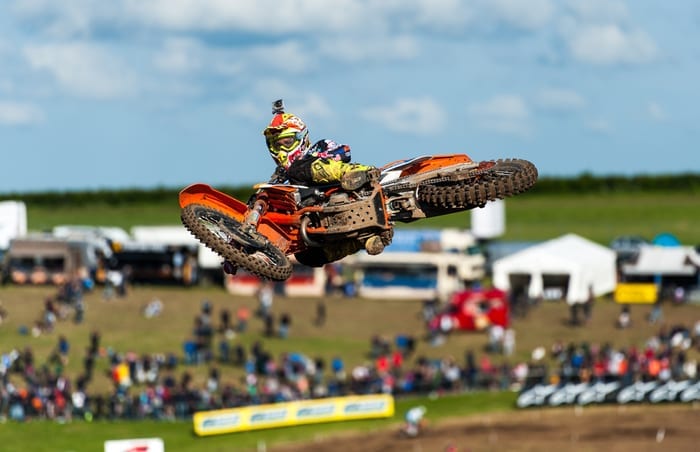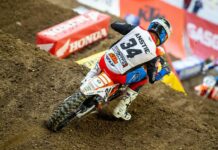With seven titles to his name and leading this year’s championship Tony Cairoli is totally comfortable with giving advice and knows where Jeffery Herlings can improve to become a better world champ.
He would even welcome Herlings in to the MXGP class, relishing at the chance to win another championship even with the ‘other’ most dominant rider in the GP paddock lining up next to him… along with the other awesome riders too!
Cairoli knows his stuff inside out and has his race strategies down pat. He continually makes great decisions when racing, choosing when to pull the pin and when to just keep enough of a lead without expending too much energy. He’s cool and calm under pressure – Cairoli is the toughest cookie to beat.
But what happened at the French GP?
After throwing the first race away by choosing a bad line, a new line that didn’t work, Cairoli made an uncharacteristic mistake – a bad decision by his own admission. Even Paul Malin and his commentating guests were picking up that things weren’t going quite right for the world champion.
In the second moto Cairoli kept Dessalle at bay the whole race and then panicked when a lapped rider made a move he wasn’t expecting, even though he has probably encountered similar situations like it many times before.
So what could be going on for Cairoli at the moment? It’s obvious that Tony has been having a tough time after his father died only a few weeks ago and if you saw his post GP interview you could see in his facial expressions that he is looking a little haggard, with bags under his eyes, frown lines in his forehead and his skin looking more ash compared to the youthful Sicilian glow he usually has.
Dealing with bereavement and grieving the loss of someone close generally involves an overwhelming amount of negative emotions, sadness, hurt, guilt and even anger – among other emotions associated with it.
This sudden influx of emotions to the nervous system can create a situation where the usual neural networks that deliver the developed strategies from the brain to the body (to produce the skills that perform certain behaviour) can have difficulty finding its way through. This is down to the negative emotions taking up space in the neural network, preventing the full flow of the crucial and highly developed strategies.
Deep in our psyche we have a mechanism called ‘fight or flight response’, which is there to protect us. It lets us know what we should do in any given situation, either to fight your corner or take flight and run away.
Now for people who already have a good amount of negative emotions running through their neurology due to events in the past or if they’ve just experienced a significant emotional trauma like Cairoli, then it’s possible that the fight or flight device gets bunged up and you experience situations where you freeze with fear or get so angry you just don’t do anything about the situation you’re in. When Cairoli came up to the lapped rider at the end of race two, is it possible that negative emotions were preventing him from making a calm, calculated decision and caused him to momentarily freeze?
Only Cairoli can answer this and I’m sure in time this will pass and he can get back to performing at his highest level.
What would the consequences have been if this situation was entering the first turn or on one of the massive jumps? How much do negative emotions get in your way when you continually experience them on a daily basis or just get in your way when competing on race days?
It’s possible to remove these negative emotions and free up your nervous system so that you can develop a freer running neurology so that you can develop the skills and behaviours that you want so you can break the heavy shackles and start experiencing more fun and success.
For further information you can contact me at edbradley@hotmail.com









